
by Doug Goldstein CFP® | Jan 2, 2018 | Behavior finance |
Who is usually a more confident investor – a man or a woman? When Professors Terrance Odean and Brad Barber conducted a study of 60,000 individual investors, they found that the male investors were far more confident in their investing decisions than their female counterparts. But is an abundance of confidence always a good thing? Overconfidence on the chessboard When chess players are too confident, they overestimate their ability, sometimes to the extent that they refuse to believe their opponents could win. In many cases, this overconfidence leads to failure. Even though overconfidence may lead to failure, many chess players are overconfident in their outlook. Why? In the book The Invisible Gorilla, Christopher Chabris and Daniel Simons describe a study where they asked tournament-level chess players two questions: What is your most recent official chess rating? What do you think your rating should be to reflect your true current strength? Given the rigorous methodology used to calculate chess ratings, the two answers should have been the same, or at least very similar. However, 75% of the respondents claimed that their actual score underrated their true ability by about 100 points. Even if statistics told them the opposite of what they believe, they were overconfident in their self-analysis. What is an overconfident investor? Overconfident investors tend to trade more actively than others. After all, they feel they have a solid grasp of how the market works, and good picks for winning investments. In the study of individual investors conducted by Professors Odean and Barber (mentioned above), single men traded 67% more actively than single women, but the men underperformed the... Click for more

by Doug Goldstein CFP® | Jan 3, 2017 | Behavior finance, Decision Making |
Letting emotions interfere with decision making is a common cause of mistakes… both on the chessboard and off. Why is it a problem when your emotions interfere with decision making? Swept away Let’s imagine the following scene: In a game of chess, your opponent moves his queen into a square that is exactly diagonal to your bishop. You didn’t expect this, and you are very excited at the thought of taking the queen. The rush of excitement at taking this important piece stops you from thinking straight –what you didn’t notice was that by so doing, you opened a pathway that threatens your king. Not only that, but your opponent’s knight was just waiting to take your bishop. What you thought was a brilliant move turned into a disaster: You lost a major piece and put your king in check! Since you didn’t take a critical moment to think, your emotions swept you away, taking control of your actions. As a result, you lost the game. The dangers of jumping in Chess player Charles Buxton warned of this when he said: “In life, as in chess, forethought wins.” The same concept applies to finance. If someone offers you a seemingly amazing financial opportunity, don’t let your emotions agree before you analyze the deal. Stop and think. What are the risks involved? Could you tolerate the loss if it turned south? A few moments of forethought and analysis could save you from a financial disaster. To help you remember not to let emotions interfere with decision making, print out this poster (and other chess posters) and hang it somewhere where... Click for more

by Douglas Goldstein | Nov 15, 2016 | Behavior finance, Financial Strategies, Podcasts |
What’s the difference between a casino and the stock market? On this week’s financial podcast, find out why the odds are much better if you invest your money in the stock market than if you try to make a huge win at a casino. Learn how to determine your real chances of winning, and why investing is not... Click for more

by Doug Goldstein CFP® | Sep 1, 2016 | Behavior finance |
When people think that they are greater, stronger, smarter, or luckier than normal, they misperceive reality and make poor decisions. For example, the vast majority of the population believes that they are above average when it comes to their driving ability, getting along with others, and having a sense of humor. But how could that be? The “average” represents the middle ground, so how can most folks be better than the average? Telling yourself what you want to hear One common cause of overconfidence is the comfort you derive from telling yourself what you want to hear. Click here to take an overconfidence test If you buy a stock that goes up, you may say, “I knew it was ready to jump.” If the investment drops, you might rationalize your decision by saying, “I might have gotten the timing a little off, but I’ll just hold on and it will recover.” Professor Dan Ariely of psychology and behavioral economics at Duke University explains, “We tell ourselves stories [about what is going on in the stock market] that try to explain what happens. And even though we’re just telling a story about a random pattern, all of a sudden we start believing in it. And because we believe in it, we believe in our ability to explain the stock market. … We say, ‘Look at me. I really understand what is going on.’ But it’s not really understanding. It’s just that you can tell yourself a story after the fact.” This story cushions the frustration that you may otherwise feel if you admit to yourself that you might not know... Click for more

by Doug Goldstein CFP® | Jul 21, 2016 | Behavior finance, Other |
The 2008 stock market crash – should we file it away as history? Even though Wall Street and the markets seem to have recovered from the 2008 stock market crash, it still matters to investors like you and me. I just finished Ben Bernanke’s book, The Courage to Act: A Memoir of a Crisis and Its Aftermath. The book is well-written and explains the background of the market collapse, the crisis itself, and the aftermath. Bernanke raises a number of fundamental questions about whether we have made the requisite structural changes in our economy to avoid such catastrophes in the future. But just because Bernanke’s policies may have worked to alleviate the crisis, doesn’t mean they were the best path America could have taken. To understand why, read my complete review of the book here. In it I discuss: Why the Fed and taxpayer’s interests aren’t aligned Why retirees took a beating Why it is so important to let individual determine how and when to spend. Read here to learn more. Douglas Goldstein, co-author of Rich As A King: How the Wisdom of Chess Can Make You A Grandmaster of Investing, is an avid chess player, international investment advisor, and Certified Financial Planner (CFP®).... Click for more

by Doug Goldstein CFP® | May 19, 2016 | Behavior finance, Financial Plan |
When you look at your investment portfolio, what do you see? Are you able to focus on all of its details at once? Many investors think they are looking at the big picture when they read over their financial portfolio, but many important details escape their attention. Their inattention to small details can have a negative effect on the decisions they make. What important information are you missing? Looking at a whole picture but missing the most significant details is actually very common. How many times have you searched for a certain item, looking all over the place, when the object you were seeking was sitting right in front of you all the time? This phenomenon has a name – “the illusion of attention,” and it occurs in many spheres of life. Examples of this are found in the popular book The Invisible Gorilla by Christopher Chabris and Daniel Simons. Click here to watch short video clips about the illusion of attention that were compiled by Chabris and Simons. How does this affect you as an investor? Do you read financial summaries and news articles often? If so, don’t rush to give yourself a pat on the back. That is because even though you are immersing yourself in financial information, you may overlook certain critical details because a minor point might have attracted your attention, distracting you from what is really important. For this reason, don’t just skim over your investment portfolio or other financial information. Pay attention to both the whole picture, as well as the small details. If you don’t know what is important or not, consult... Click for more










